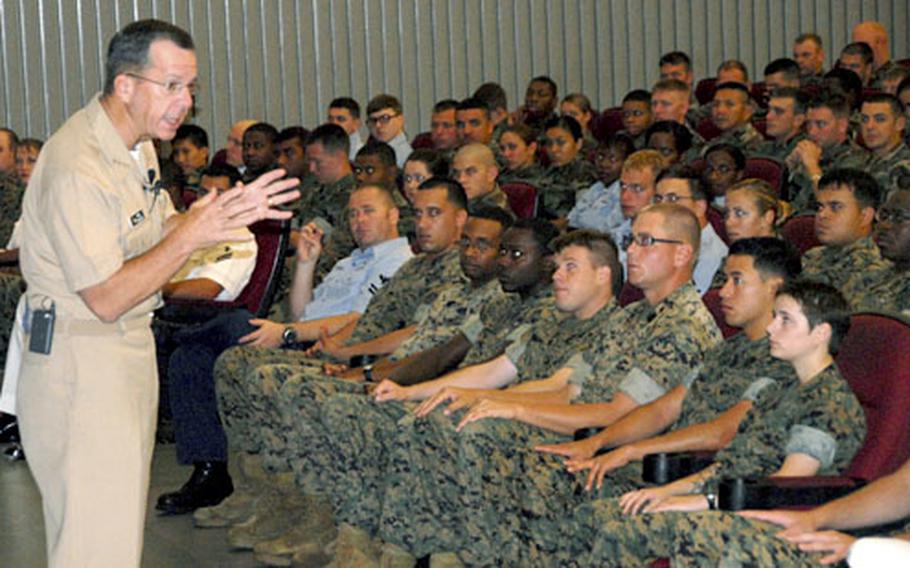
Adm. Michael Mullen, chief of naval operations, addresses the enlisted sailors stationed on Okinawa. “You’re making a difference in what I consider a very critical time," he said. (Megan McCloskey / Stars and Stripes)
CAMP FOSTER, Okinawa — There will be no slowdown in naval individual augmentee deployments, but sailors can expect them to play an important part in promotions and assignment selections, the chief of naval operations told a group of Okinawa-based sailors Monday morning.
“COs need to understand we’re going to keep doing this … it isn’t an Army or a Marine Corps war. It’s a national war,” Adm. Michael Mullen said, referring to Iraq and the ongoing war on terror.
Mullen was on the island for the last stop of his Asia tour that took him to Kuala Lumpur, Malaysia, and Jakarta, Indonesia, among other cities. He took questions from enlisted sailors and officers after speaking to the groups separately.
Rotation and deployment issues were a hot topic among both groups. Mullen said individual augmentee deployments aren’t “going to go away,” but the Navy is in the early stages of making sure they’re considered important during the promotion process.
Thousands of individual augmentees are deployed around the world, but Mullen said he thinks it isn’t the figures that cause concern among sailors but rather the uncertainty associated with it. “They think ‘is my number coming up?’” he said.
The Navy is in the process of extending the deployment notice to 60 days, “so people can plan their lives,” Mullen said.
There also is a possibility individual augmentees’ dependents will be able to move back to their families while the augmentee is deployed, he added. There are no plans, however, to have the augmentee permanently change duty stations and give the unit that lost the manpower any relief, Mullen said.
Altering rotation schedules for better quality of life and retention is a top priority, he said. In the next 18 to 24 months the Navy’s tour rotation policy will change with the goal that each sailor is at his home port for 50 percent of the year — something that is far from being achieved now. “The family bears a big burden,” he said. “In the end that issue must be addressed or good people aren’t going to stay in the Navy.”
Mullen also talked about how the Pacific is a critical area and the fleet over here must maintain continuous readiness to ensure stability, especially in light of North Korea’s recent actions. “One of the real threats in the future is the proliferation of ballistic missiles,” he said.